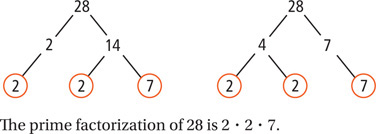Skills Handbook
Prime Numbers and Composite Numbers
A prime number is a whole number greater than 1 that has exactly two factors, the number 1 and itself.
| Prime number | 2 | 5 | 17 | 29 |
|---|---|---|---|---|
| Factors | 1, 2 | 1, 5 | 1, 17 | 1, 29 |
A composite number is a number that has more than two factors. The number 1 is neither prime nor composite.
| Composite number | 6 | 15 | 48 |
|---|---|---|---|
| Factors | 1, 2, 3, 6 | 1, 3, 5, 15 | 1, 2, 3, 4, 6, 8, 12, 16, 24, 48 |
Example 1
Is 51 prime or composite?
51 is a composite number.
You can use a factor tree to find the prime factors of a number. When all the factors are prime numbers, it is called the prime factorization of the number.
Example 2
Use a factor tree to write the prime factorization of 28.
The order of listing the factors may be different, but the prime factorization is the same.
Exercises
Is each number prime or composite?
- 9
- 16
- 34
- 61
- 7
- 13
- 12
- 40
- 57
- 64
- 120
- 700
List all the factors of each number.
- 46
- 32
- 11
- 65
- 27
- 29
Use a factor tree to write the prime factorization of each number.
- 18
- 20
- 27
- 54
- 64
- 96
Table of Contents
- 2-1 and 2-2 Solving One- and Two-Step Equations
- 2-3 Solving Multi-Step Equations
- 2-4 Solving Equations With Variables on Both Sides
- 2-5 Literal Equations and Formulas
- 2-6 Ratios, Rates, and Conversions
- 2-7 and 2-8 Solving Proportions and Using Similar Figures
- 2-9 Percents
- 2-10 Change Expressed as a Percent
- 3-1 Inequalities and Their Graphs
- 3-2 Solving Inequalities Using Addition or Subtraction
- 3-3 Solving Inequalities Using Multiplication or Division
- 3-4 Solving Multi-Step Inequalities
- 3-5 Working With Sets
- 3-6 Compound Inequalities
- 3-7 Absolute Value Equations and Inequalities
- 3-8 Unions and Intersections of Sets
- Chapter 1 Foundations for Algebra
- Chapter 2 Solving Equations
- Chapter 3 Solving Inequalities
- Chapter 4 An Introduction to Functions
- Chapter 5 Linear Functions
- Chapter 6 Systems of Equations and Inequalities
- Chapter 7 Exponents and Exponential Functions
- Chapter 8 Polynomials and Factoring
- Chapter 9 Quadratic Functions and Equations
- Chapter 10 Radical Expressions and Equations
- Chapter 11 Rational Expressions and Functions
- Chapter 12 Data Analysis and Probability





